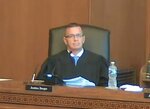

This article was originally published by NC Newsline on Oct. 26, 2023.
The state Supreme Court has granted a discretionary review of North Carolina’s long-running school funding case to address whether the trial court lacked “subject matter jurisdiction” when it ordered the state to spend an additional $677 million on a sweeping school improvement plan.
In a concurring opinion, Justice Phil Berger Jr., said the Court is duty-bound to address “crucial issues” of subject matter jurisdiction in the case. The legal term speaks to whether a given court has the power to hear a specific claim that is brought before it.
“Because these crucial issues of subject matter jurisdiction cannot be waived and must be addressed by this Court, it is a sound exercise of this Court’s constitutional role to take this case and permit the parties to brief the various issues including standing, joinder of necessary parties, averseness, intervention, and jurisdiction of the trial court to provide the requested relief, all of which are necessary jurisdictional prerequisites to execution of the trial court’s remedial order,” Berger wrote.
Superior Court Judge James Ammons issued the order for the additional funding on April 17, ruling that the state must pay for school improvement items in a court-backed comprehensive funding plan. The plan calls for qualified teachers in every classroom and well-trained principals in every school, along with resources students need for a sound basic education.
State Republican leaders, who are Legislative Intervenors in the case, asked the state’s highest Court to take another look at the nearly 30-year-old decision in September. By agreeing to do so, the Supreme Court will now hear the appeal filed by Sen. Phil Berger and House Speaker Tim Moore.
Justice Phil Berger Jr., is the son of Sen. Berger. No court date has been set for the Court to review the case.
At the heart of the Legislative Intervenors’ argument is whether the trial court’s order for the state to pay for the school improvement plan should extend beyond the five counties in the original lawsuit.
The justices’ vote on the order was split along party lines, with five Republicans voting in favor and Democrats Anita Earls and Allison Riggs voting against it. The new development in the case could have far-reaching implications and could keep the case tied up in court for months or years to come.
Earls wrote in the dissent that the legislators’ bypass petition should be denied because it is “substantially hollow and procedurally improper.”
The court resolved the question of subject-matter jurisdiction last year in Leandro IV, Earls wrote, referring to the fourth version of the case that is commonly referred to as Leandro, the surname of one of the original plaintiffs.
“In that case—just 11 months old—the Legislative Intervenors raised the same arguments they do in their bypass petition: That the trial court lacked jurisdiction to remedy constitutional deficiencies in public education. We examined that claim and “unequivocally rejected” it,” Earls wrote.
Meanwhile, Berger noted that Earls previously served as a lawyer for the Penn Intervenors, one of the parties involved in the case.
He wrote: “The lawsuit, at that point, focused on educational deficiencies in rural counties in the eastern part of our State. The Penn Intervenors sought intervention to “enforce their constitutional rights to a sound basic education” against the Charlotte-Mecklenburg School System. Core to their rationale for intervention was that every public school district faces its own unique educational challenges and groups of students or school districts in one area of our state are ill-suited to address the educational deficiencies in others.”
That raises questions about who has standing in the lawsuit, Berger wrote.
“If public school students or local school boards who are not parties to this case believe the remedial order does not sufficiently address the educational failure in their districts, are they bound by the remedial order? If so, how were their rights adjudicated without their presence in the suit—an elementary principle of jurisdictional law,” Berger added.
If districts are not bound by the remedial order and can bring their own claim, Berger wrote, how did the trial court have “jurisdiction to enter a judgement purportedly adjudicating they rights?”
Earls countered that the Court focused on “one foundational question” and that was whether North Carolina was complying with its constitutional mandate to provide all children with a sound basic education. After several years of fact finding, research and public hearings that culminated in a 14-month trial, she said, the Court found that “there were at-risk students failing to achieve a sound basic education statewide.”
“Since the trial court found statewide constitutional violation, we explained, it had subject-matter jurisdiction to order a statewide remedy,” Earls wrote.
The Legislative Intervenors ignored the trial court’s conclusion, and wrongly argued that there is has never been a finding of constitutional violation beyond Hoke County, one of the five counties named in the original lawsuit, Earls said.
The Leandro case began nearly three decades ago when school districts in five low-wealth counties sued the state, claiming that children were not receiving the same level of educational opportunities as students in wealthier counties. School districts in Cumberland, Hoke, Robeson, and Vance counties joined Halifax County in the lawsuit.
In 1997, the state Supreme Court issued a ruling, later reconfirmed in 2004, in which it held that every child has a right to a “sound basic education” that includes competent and well-trained teachers and principals and equitable access to resources.
Education Reporter Greg Childress covers all aspects of public education in North Carolina, including debates over school funding, curricula, privatization, and teacher pay and licensing. Childress can be contacted at gchildress@ncnewsline.com.